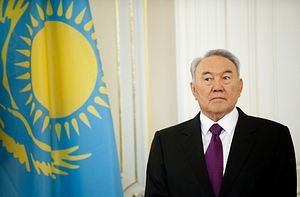During his annual state address, Kazakh President Nursultan Nazarbayev pushed for a joint bilateral commission to investigate the downing of a Russian Su-24 on November 24 by a Turkish F-16. The incident shifted previously amicable Turkish-Russian relations into a downward spiral — harsh words have been exchanged, and Russia has imposed sanctions on Turkey and suspended visa-free travel.
Meanwhile, Russian and Central Asian news outlets have been critical of Turkey’s role in the conflict in Syria, with many carrying stories and op-eds on Turkey’s alleged purchases of oil from ISIS. A piece in Asia-Plus went so far as to accuse Turkey of shooting down the Russian jet as “revenge” for Moscow bombing a convoy of trucks smuggling oil, though the story is based on Sputnik reporting along the same lines.
As has been noted elsewhere, the deterioration of Turkish-Russian relations puts Central Asia in a tight spot. For a host of economic, social, and political reasons Turkey has been a reliable partner throughout the region but Russia’s importance still surpasses that of any other regional or international actor. Central Asian leaders are likely to play it safe and say little about the tensions — with the exception of Kazakhstan, which has been purposefully building itself up as an international pivot point.
Increasingly, Kazakhstan has stepped into the role of mediator (or interpreter, perhaps) between Russia and the world. The crisis in Ukraine is an excellent example of Kazakhstan’s style in this regard. Astana has maintained relations with both Moscow and Kiev, hosting Russian President Vladimir Putin often but also Ukrainian President Petro Poroshenko. Poroshenko, during his October visit to Astana, thanked Nazarbayev for his “firm and unwavering support for Ukraine’s territorial integrity and sovereignty within the internationally recognized borders.”
Nazarbayev seems intent on placing Kazakhstan similarly as a node between Turkey and Russia. But his comments demonstrate a bit of a lean toward Moscow’s view of the events. According to Trend, Nazarbayev said, “So far, we don’t know all the different nuances of this question… But the fact is that the Russian bomber didn’t attack Turkey, it was not heading for Turkey, but for war with terrorists.”
The Kazakh president comes across as disappointed with how quickly relations between Turkey and Russia have deteriorated. As quoted by the Astana Times:
I am someone who has worked for many years in order to bring Russia and Turkey closer together, to make their relationship friendly. Since the time of Prime Minister [of Turkey Süleyman] Demirel, starting with President [of Russia Boris] Yeltsin. And all of this that was built over many years could now come to nothing.
Trend’s translation was more colloquial, but reached the same tone: “All this, which has been achieved throughout many years, may go down the drain.”
The Astana Times also reported that Turkish President Recep Tayyip Erdogan phoned Nazarbayev and said he’d be willing to meet with Putin. The two leaders are both in attendance at the Paris climate change conference but Putin’s spokesman Dmitry Peskov told journalists “No meeting with Erdogan is planned. There is no discussion of such a meeting.”

































